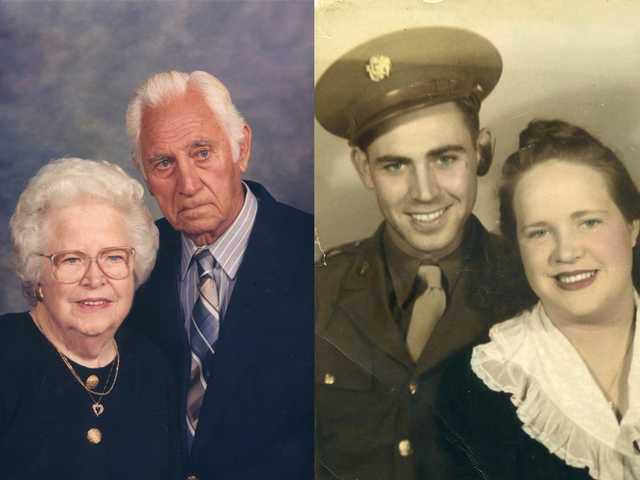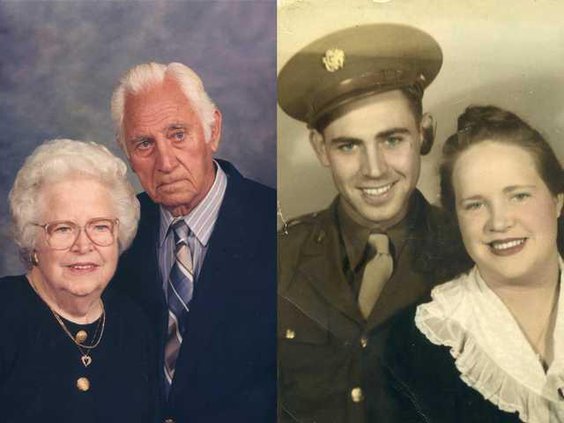Not all love stories are fairy tales full of magic and make believe. No. Sometimes, true love finds a more practical vessel — like two teenagers meeting through a mutual acquaintance and striking up a conversation. Such is the case for Vaughn and Ora Lee Little, who may not have swooned with love at first sight, but whose marriage has withstood the test of time. Seventy years to be exact. "We met in 1937 going to a basketball game," Vaughn Little said. "We had to walk from her cousin’s house to catch the school bus to the game. We talked and held hands on the way there and when we got back." Although he can’t remember today exactly what drew him to his wife-to-be, Little remembers that somehow she got under his skin. And somehow the two decided they’d like to court. For two young-adults coming of age during the height of the Great Depression, there wasn’t much use for fanciful notions of romanticism and extravagant gifts. "I didn’t have a car, but we got a date every once in a while," said Little. At the time, Little lived in Hall County, but Ora Lee lived in Winder. "There wasn’t no darn phones. We only had one in my community. The lawyer had it. If you needed to call the doctor or something, you’d go over there and ring him up. If you could get him. It was aggravating," Little said. "There wasn’t no cars, wasn’t no running water, no inside bathrooms. Wasn’t but one radio in our neighborhood." Instead of staying on the phone until the wee hours of the morning or meeting for daily lunch dates, the couple’s courtship was a more practical one. They wrote letters. After a few years, Little decided it was time for them to take their courting to the next level. He proposed, she said yes and that was that. But there would be no big wedding for Little and his June bride. "Nobody had any money. The day we got married, I don’t think we had $50 between us," Little said. "The justice of the peace married us (at his house). We didn’t have no rings — we didn’t have money to buy them." They spent their honeymoon night at the Dixie Hunt Hotel in downtown Gainesville, which is now on the National Register of Historic Places. Afterward, they decided to plant their feet in Winder. "We rented two rooms with a bath — no furniture — for $8 a month," Little said. Together, the industrious couple made their rented house a home. "We both worked on the night shift. I worked in a furniture plant and she worked in a sewing plant. We each made $12 a week," Little said. "We finally got $25 to pay down on furniture. We got a bedroom suite, an oil stove and a 50-pound icebox — wasn’t no refrigerators. "She paid the furniture (note) and I paid all the other bills." Eleven months into their union, the newlyweds were hit with a piece of unfortunate news — Little had to report for military duty. "We were married June 7, 1941 and I went to service in May 1942," Little said. Not only did Little have to leave his new bride without his daily companionship, he also had to leave her without his usual salary. "I made $21 a month as a private," Little said. That was more than a 50 percent pay cut. To make ends meet, Ora Lee Little moved back in with her mother. And living with them were her sisters, whose husbands were also serving in the military, and their children. Although much of his four-year military career was spent overseas, there was a time that Little was stationed in Bryan, Texas. "When he got to live off-post, she’d catch a train out to Texas and live with him for a while, until he had to go back on post," said Gayle Leach, the couple’s oldest daughter. "She told me she took the train so often that she knew every stop between here and Bryan, Texas." From 1943 to 1946, Little was overseas fulfilling his duties as a supply sergeant. "I didn’t get to come home during that time," Little said. Ever the faithful bride, Ora Lee Little did what every other war bride did. She worked to pay off their furniture debts and wrote letters as often as she could. "Sometimes it would take a month to get them," Little said. After completing his service duties, the couple re-established their Winder homestead. During that time, Little learned just how thrifty his wife had become while he was away. "They raised our pay in July 1942 from $21 a month to $50, but I still didn’t get but $20-something then because I sent the rest to her," Little said. "But she didn’t spend it. She saved it all." Despite her scrimping while he was away, life wasn’t all roses for the couple. The Great Depression may have ended years prior, but the country was still in recovery mode. "Even when I got back (from active duty in 1946) you couldn’t find work," Little said. "Things didn’t really start getting better until the (1950s). We had some rough days, but we made it." They did more than make it. Their family thrived. Ora Lee would eventually give birth to three daughters. Today, the couple has four grandchildren and three great-grandchildren. Unfortunately, 89-year-old Ora Lee Little’s declining health dictated that she be admitted to a nursing home, but her 90-year-old husband took his "in sickness and in health" vows very seriously. "I go visit her every morning," Little said. "Just to make sure she’s doing good and being taken care of." Although Tuesday marks their 70th anniversary, Little says the milestone was never something they focused on. It just happened as they were busy living their lives and raising their family. Throughout the years, the Littles may have had disagreements, but in the end they always agreed on one thing — if you get married, you stay married no matter what. You work through your problems. "You fuss," Little said, "but you forget it. You move on."

